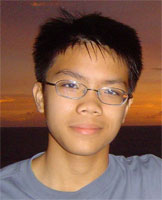On April 16th this year, a deranged Virginia Tech student, Cho Seung-Hui from Korea, went on a shooting rampage, cutting short 33 young lives, including his own.
---Original articles---
General overview: US university shooting kills 33 [BBC]
More detail on Cho Seung-Hui, the deranged murderer: Killer’s manifesto: You forced me into a corner [CNN]
---On Cho Seung Hui: videos and quotes---
“You had a hundred billion chances and ways to have avoided today," Cho said in one of the videos that aired Wednesday night on NBC. "But you decided to spill my blood. You forced me into a corner and gave me only one option. The decision was yours. Now you have blood on your hands that will never wash off.” –Cho
Cho's "video confession"
Two disturbing plays Cho wrote: Richard McBeef and Mr Brownstone
---Background information: A state of nature and the social contract---
In Leviathan , the philosopher Thomas Hobbes once put forth the idea of a state of nature: Before the emergence of organised society and restrictions on free action, man existed in a state of nature. In such a state of nature, man, being selfish, did anything, including harming others, to benefit himself. The result, according to Hobbes, is "a war of all against all", and a "solitary, poor, nasty, brutish, and short" life.
Society has evolved to formulate a social contract, however, that seeks to prevent society from descending into a state of nature. Individual freedoms have been curtailed whenever they infringe on the basic rights of others. The rule of law, a universal moral code, enforces this, giving a state of peace and guaranteeing the security of the individual.
Further reading
---Personal reflection---
Life is amazing and beautiful. But it is incredibly fragile. I am stunned how such a terrible thing could happen in a school, where students study in the knowledge that they are shielded from the dangers of the outside world. How could a student, with such a promising future, suddenly decide to end his life, and take 32 others with him? There are a surfeit of questions, but few answers.
First, and foremost, this is a sad reflection of the human condition, of how a man's vicious anger and frustrations can interplay to produce horrendous actions and the most heartbreaking consequences. Why are we - even the best and the brightest in universities - capable of blatantly disregarding the rights and happiness of others, and harming them, for self-interest, revenge, or otherwise?
The shaken notion of a civil society
We often pride ourselves on having built a civil society, by enacting laws as a moral code, and inculcating in our young the values that build such a society, such that indivduals no longer act purely in self-interest and harm others, but are considerate, making for more pleasant lives for everyone.
But this notion of a civil society has been shaken time and again, by murders like Cho, and by fanatical terrorists.
Is this the sad state of morality today's "civil" society has bred? Or has today's society merely evolved such that Hobbes' "state of nature" and "war of all against all" merely superficially suppressed but not overcome, such that it is ready to rear its ugly head and guarantee misery for all and sundry once triggered?
A more caring society, please?
Cho's machine-gun rampage seems to be as much his fault as it is society's. It turns out that he has few friends, and does not fit into society. His anger and discontent with society, as well as his violent tendencies were well-known - in fact, he was once admitted into a mental hospital. Why didn't anyone do anything, such that Cho can say "you forced me into a corner"?
Similarly, the Muslim terrorists that blew themselves up on crowded Tube trains in July 2005 came from a marginalized and poor group of society. Honestly, it is impossible for me to understand their feelings and point of view, but I don't blame them for being disillusioned with society, when society treats them so badly.
It is these outcrops of society that are discontentd with society and such horrific disasters are bred. I say, we should care a lot more about such outcrops of society, e.g. by reaching out to people like Cho and seeking to integrate them into society, and in the case of the terrorists, providing their communities with good education and equal opportunities.
Before our society can claim to be civil, it must first be caring. Otherwise, a "state of nature", and the lawless anarchy and misery it guarantees, may not be so far away. All it takes is one nuclear-armed terrorist to blow a city to smithereens.
(499 words)
skip to main |
skip to sidebar

Nigel Fong's blog
Pages
Links
- Joel Tan
- Daniel
- Joel Kek
- Sampson
- Hui Yao
- Jon Lim
- Charles
- Mark
- Shaowei
- Andrew
- Guowei
- Joel Seah
- Ren Yan
- Jarrell
- Ken
- Zheng Yi
- Theodore
- Jian Xiong
- Brian Ho
- Biquan
- Luwei
- Zewei
- Shu Kiat
- Phoebe
- Erika
- Li Young
- Rebecca
- Miss Chia
- mrbrown
- Gayle Goh
- Interview with Jesus
- ChristNotes
- RI
- Wikipedia
- Youtube
- Apple
- The Economist
About Me

- nigelfong
- Christian | Mt Carmel B-P Church Rafflesian | 1M 2005 | 2M 2006 | 3C 2007 RIPB | Debator | Science Clubber | Photographer | Humanities quiz team ex-SHPS | ex-Changkat Contact: nigelfong@gmail.com